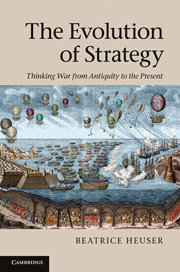Book contents
- Frontmatter
- Contents
- Acknowledgements
- A note on referencing
- Part I Introduction
- 1 What is strategy?
- PART II Long-term constants
- PART III The Napoleonic paradigm and Total War
- PART IV Naval and maritime Strategy
- PART V Air Power and nuclear Strategy
- PART VI Asymmetric or ‘small’ wars
- PART VII The quest for new paradigms after the World Wars
- Bibliography
- Index
1 - What is strategy?
from Part I - Introduction
Published online by Cambridge University Press: 05 June 2012
- Frontmatter
- Contents
- Acknowledgements
- A note on referencing
- Part I Introduction
- 1 What is strategy?
- PART II Long-term constants
- PART III The Napoleonic paradigm and Total War
- PART IV Naval and maritime Strategy
- PART V Air Power and nuclear Strategy
- PART VI Asymmetric or ‘small’ wars
- PART VII The quest for new paradigms after the World Wars
- Bibliography
- Index
Summary
Man made War in his own image.
(Willmott 2002: 14)The way in which a society makes war is a projection of that society itself.
(Sidebottom 2004: 35)Art of war or science of war, and technical definitions of ‘strategy’
‘Thinking war’: this is how the French sociologist Raymond Aron characterised Clausewitz’s work (Aron 1976). It is a conceptual challenge to write about the evolution of Strategy, especially with an emphasis on the social institutions, norms and patterns of behaviour within which it operates, the policies that guide it and the culture that influences it. For, as we shall see presently, the use of the word ‘strategy’ has changed very considerably over time. This book’s main purpose is not to provide a history of the word ‘strategy’ and all that it denoted over time. Instead, it will examine how people thought about the link between political aims and the use of force, or its threat, which we will refer to as Strategy with a capital ‘S’. This definition will be applied retrospectively to find out how strategists – writers on the conduct of war – thought about this issue in the past, whether or not they employed the actual term ‘strategy’, which after classical antiquity only came into use again around 1800.
Nevertheless, the evolution of the term ‘strategy’ itself must be our starting point, not least in order to understand why there is so little agreement on the use of the term, and why it has changed so much over time. The Greek word ‘strategy’ (either as strategía or strategiké) was used in antiquity for the art or skills of the general (the strategós) – ‘the general is the one who practises strategy’. By the sixth century at the latest, however, at the time of Emperor Justinian, in Byzantine usage, a difference was made between ‘strategy’ – ‘strategy is the means by which the general may defend his own lands and defeat his enemy’s’ – and, hierarchically subordinated to it, ‘tactics’ (taktiké), the ‘science [epistéme] which enables one to organize and maneuver a body of armed men in an orderly manner’ (Anon. 6th c./1985: 10–135). It is possible that such definitions had already found their place in earlier works, such as the lost parts of Aeneas Tacticus (c. 357 BCE) or Frontinus (c. 35–103 or 104 CE). In either case, Frontinus in his Latin work on stratagems or ruses used the Greek words both for stratagem (strategémon) and for strategy (strategía), as neither word had a proper Latin equivalent (Frontinus c. 1st c. CE: I). Nor did Greek texts of the following centuries distinguish systematically between strategy and tactics. Maurice (539–602), the East Roman (Byzantine) emperor (from 582) wrote a work known a Strategikón, which dealt mainly with technical aspects of the conduct of war. A similar subject matter was discussed in a book in Greek called Taktiké Theoría dating from the second century CE, written by Aelianus Tacticus. Emperor Leo VI (‘the Wise’, 865–912, emperor from 886) drew extensively on Aelianus in his own work, which later became known, not entirely appropriately, as Taktiká (Leo c. 900/1917), as Leo used the terms strategía and taktiké in the same hierarchical way as the sixth-century work referred to above. It would be Leo’s work that would bring this greater meaning of ‘strategy’ to the West. Count John of Nassau-Siegen (1561–1623) in his Book of War drew on Maurice’s Stratégikon and on Leo’s Taktiká. John did not adopt the Greek term ‘strategy’, circumscribing it with the general’s (Feldher) tasks. The word ‘tactic’ he actually used (John ‘the Middle’ 1610/1973: 17, 516, 642). John thus built on Leo’s analytical framework, which resonated in the literature, even though the word strategía had not yet become integrated into the Western languages.
- Type
- Chapter
- Information
- The Evolution of StrategyThinking War from Antiquity to the Present, pp. 3 - 36Publisher: Cambridge University PressPrint publication year: 2010



